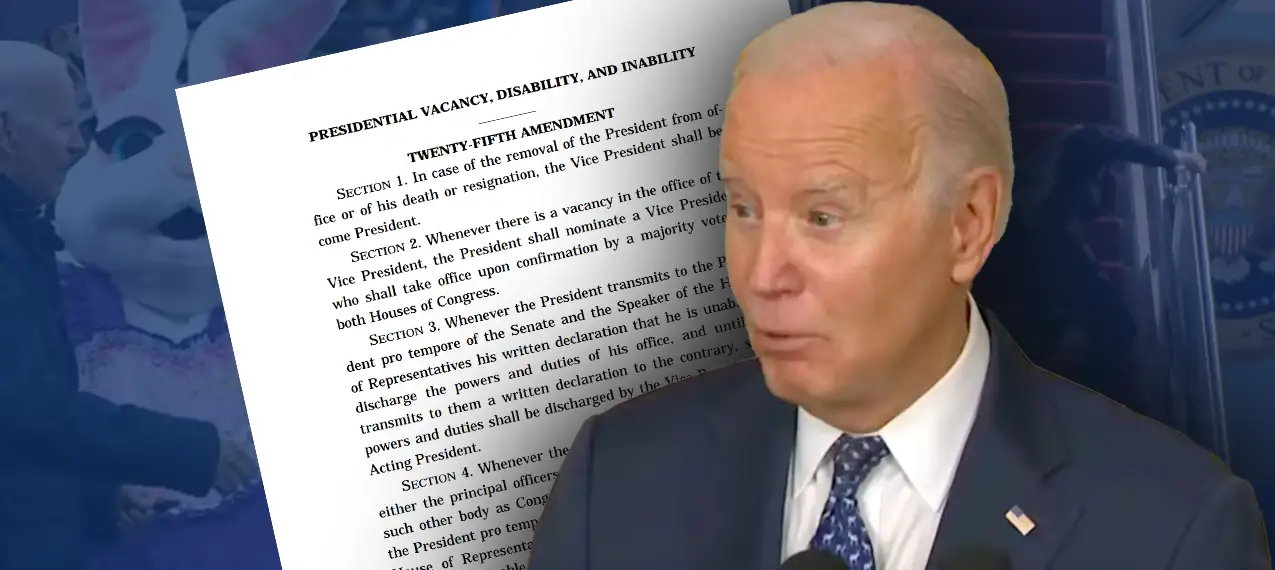
Introduction
On February 5, 2024, Special Counsel Robert Hur released his report on President Biden’s mishandling of classified documents from his time as vice president. Hur explained he chose not to prosecute Biden because a jury would see Biden as “a sympathetic, well-meaning, elderly man with a poor memory” whose actions are not criminal because such “a serious felony that requires a mental state of willfulness.” Given this assessment, many fear Biden lacks the mental fitness required to properly discharge the duties as president. The 25th Amendment to the Constitution provides a mechanism for removing a sitting president because of inability to discharge his duties.
History
Following the assassination of John F. Kennedy, Congress ratified the 25th Amendment to clarify the procedure for presidential succession. If a president cannot discharge his duties in the event of death, removal, resignation, or incapacitation, the vice president assumes the presidency. U.S. Cont. amend. XXV, § 3. Section 3 also allows the president to transfer powers to his vice president should he be incapacitated. This occurred in 1985 when President Regan underwent surgery for colon cancer. Presidents George W. Bush and Joe Biden have also invoked Section 3 when undergoing medical procedures.
More famously, both Presidents Nixon and Ford invoked the 25th Amendment following the Watergate scandal. First, President Nixon used Section 4 to replace Vice President Spiro Agnew with Gerald Ford following Agnew’s resignation in 1973. Then after Nixon resigned in 1974, Ford became president, as directed by Section 1 of the Amendment.
The 25th Amendment also creates procedures for removal should the president become unable to fulfill his duties. Section 4 states that if the vice president and a majority of the cabinet secretaries conclude the president cannot discharge his duties, the vice president assumes the powers of the presidency. U.S. Cont. amend. XXV, § 4. The president, however, is allowed challenge this conclusion. If challenged, both chambers of Congress must vote by 2/3rds majority that the president is unfit for office; otherwise, he will retain the presidency. Invoking the 25th Amendment in this way has never been occurred, but the intensifying scrutiny surrounding President Biden’s mental fitness has led some to call for its use.
Judging a President’s Fitness for Office
Successfully invoking Section 4 of the 25th Amendment requires the vice president, a majority of the cabinet secretaries, and 2/3rds of Congress to agree the president “is unable to discharge the powers and duties of his office.” U.S. Const. Amend. XXV, § 4. Considerable ambiguity exists when determining what constitutes an inability to discharge powers. A Yale Law School study concluded that “the framers specifically rejected any definition of the term [unable], prioritizing flexibility.” Yale Law School, The Twenty-Fifth Amendment to the United States Constitution 6 (2018), https://law.yale.edu/sites/default/files/area/clinic/document/mn082208.yls.const.fnl.pdf.
Several commissions have studied this topic but reached no widely accepted conclusions. University of Virginia’s Miller Center, for example, recommend the vice president and cabinet secretaries consult the White House physician, the First Lady, members of the White House staff, and other experts when making their determination. The Commission recommended the White House physician learn about the 25th Amendment and establish “a written protocol regarding the use of these provisions” under the Amendment before each president-elect is sworn in. Miller Center Commission, Report on the Commission on Presidential Disability and the 25th Amendment, 19 (1988), http://web1.millercenter.org/commissions/comm_1988.pdf. A thorough understanding of the 25th Amendment should extend to White House staff and the First Lady. The security of the United States depends on these people giving unbiased and accurate assessments of the president’s health. They warn “whenever an administration practices deceit of any kind, the office of the president loses stature and respect.” Id. at 11. Again, although this guidance has been released there is no definitive procedure for invoking and executing Section 4.
When a sitting president appears to display cognitive decline, questions about his or her capacity to fulfill the immense duties of office will inevitably raise the issue of invocation of the 25th Amendment. Alexander Hamiliton asserts that “energy in the Executive is a leading character in the definition of good government.” The Federalist No. 70 (Alexander Hamiliton) (C. Rossiter ed., 1961). When the Executive fails to practice competent energy, they should be removed from office. What this means and what standards should exist when judging the energy of the president remains a topic of debate.
SUPPORT LANDMARK LEGAL FOUNDATION
We are truly facing existential threats to our individual rights and liberties, the Constitution, and our national character. If unchallenged, this assault on our very way of life will ruin our great nation. With your financial and moral support, Landmark is not going to let that happen without a fight. Will you join us?
JOIN OUR MAILING LIST
Never miss an update from Landmark Legal Foundation as we continue the fight to preserve America’s principles and defend the Constitution from the radical left.
Landmark will NEVER share your contact information and we will not flood your inbox.





